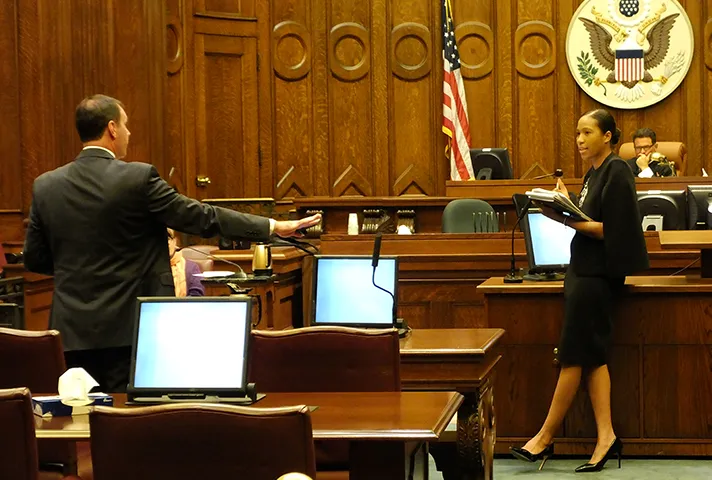A fair and impartial criminal justice system requires that all defendants have access to legal representation and other defense services. The Judiciary ensures that the Sixth Amendment right to counsel and the rights provided under the Criminal Justice Act are protected through the work of dedicated federal defenders and panel attorneys.
Criminal Justice Act Program Review
The Judiciary took several key steps in 2019 toward implementing the recommendations of the Ad Hoc Committee to Review the Criminal Justice Act (CJA). The committee’s recommendations were based on a comprehensive review of the administration of the public defense system in the federal courts. At year’s end, the Judicial Conference had approved nearly all the committee’s 35 interim recommendations.
The ad hoc committee was created by Chief Justice John G. Roberts, Jr. and is known as the Cardone Committee for its chair, Judge Kathleen Cardone of the Western District of Texas. The Cardone Committee finished a two-year review of the CJA program in November 2017 and sent its findings and recommendations to the Judicial Conference. Recognizing that its central recommendation – the creation of an independent federal defender commission – would require significant review by the Judicial Conference and ultimately would require congressional action, the Cardone Committee made 35 interim recommendations designed to address some of the issues identified in its report.
At the close of the year, the Conference had approved 29 of the interim recommendations — 10 were acted on in 2019, and 19 were resolved the year before. Some of the original recommendations were revised after consultation with Judge Cardone and the chairs of other relevant Conference committees whose jurisdictions were involved in the changes.
Among the recommendations approved in 2019 were:
- New standards for the review of CJA vouchers, which are the bills submitted to the court by panel attorneys, who are private attorneys retained by a court to represent financially eligible defendants in criminal cases;
- Policies fostering the greater availability of qualified attorneys to be on CJA panels, which are court-generated lists of panel attorneys;
- Greater involvement of federal defender offices and CJA supervisory attorneys in selecting attorneys for CJA panels;
- Increased use of case-budgeting attorneys for review of CJA vouchers and requests for service providers in preparing the defense of a defendant; and
- More training for judges and court staff on defense best practices, electronic discovery needs, and other issues relevant to federal criminal defense.
Consideration of the Cardone Committee’s final recommendation – to create an independent federal defender commission – was deferred to a future Conference session to ensure adequate time for a thorough review. Three interim recommendations were deferred until the Conference addresses the final recommendation. The Judicial Conference directed the Defender Services Committee, with the assistance of the Federal Judicial Center, to do an assessment of how the Judiciary has implemented the interim recommendations and the degree to which those changes have addressed the concerns identified by the Cardone Committee. The assessment continued into 2020.
Pay Adjustment for Panel Attorneys
The hourly rate for court-appointed private lawyers, known as panel attorneys, rose by $8, to $148, in non-capital cases, as part of the Judiciary’s fiscal year 2019 appropriations passed by Congress. The increase included a $2 hourly cost-of-living adjustment with an additional $6 hourly increase, bringing the total hourly rate to $148, just $1 below the statutorily authorized maximum rate of $149. The Judicial Conference and the federal defense community have been advocating an increase in the rate of pay for panel attorneys to the statutorily authorized level in order to attract experienced attorneys. Surveys show that relatively low rates of pay for panel attorneys make it difficult to retain qualified and experienced lawyers. The increases were included in the $7.25 billion annual appropriations for the Judiciary for fiscal year 2019.
In fiscal year 2020, the Judiciary asked Congress for the additional $1-above-inflation increase to the non-capital hourly rate to achieve the statutory maximum. The increase was not included in the $7.49 billion appropriations bill for the Judiciary. The appropriations measure did allow for inflationary adjustments to the capital and non-capital panel attorney rates to $195 and $152 per hour, respectively, for work performed after Jan. 1, 2020.
Training for Federal Defenders and CJA Panel Attorneys

Chanise Anderson, a lawyer attending the Litigation Academy, receives feedback about entering documents into evidence during a training session in a Providence, RI courtroom.
In 2019, the Administrative Office of the U.S. Courts conducted 77 training events for CJA panel attorneys, federal defenders, paralegals, and investigators. The programs included national, local, and webinar events, and provided substantive legal training on criminal law and procedure and in-person, skills-based workshops on trial practice, electronic case management, legal writing, and sentencing mitigation. Attendees also received training on administrative and managerial issues. Forty-four in-person national programs, 21 local programs, five podcasts, and seven webinars were conducted in fiscal year 2019.
Annual Report 2019
- Annual Report 2019
- Funding/Budget
- The Courts and Congress
- The Federal Bench
- Accountability and Resource Management
- Facilities and Security
- Public Outreach
- Court Operations and Case Management
- Defender Services
- Probation and Pretrial Services
- Human Resources
- Information Systems and Cybersecurity
- Recent and Proposed Amendments to Federal Rules
- In Profile
